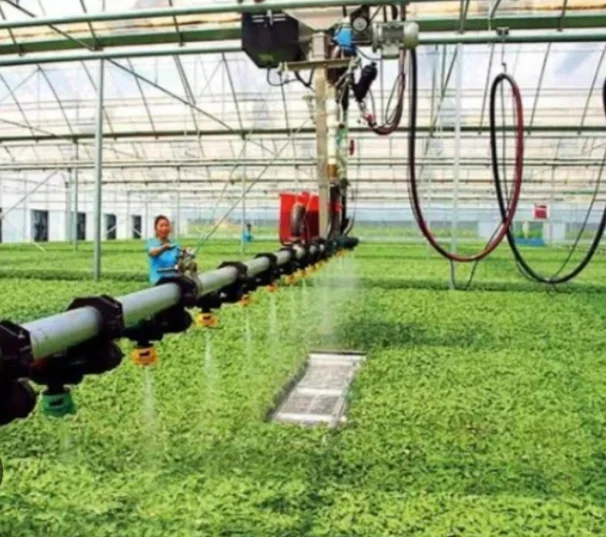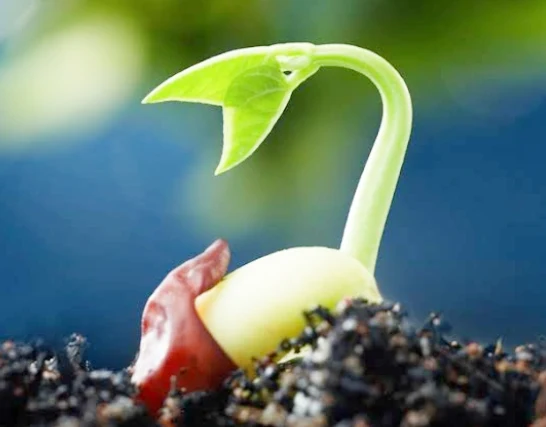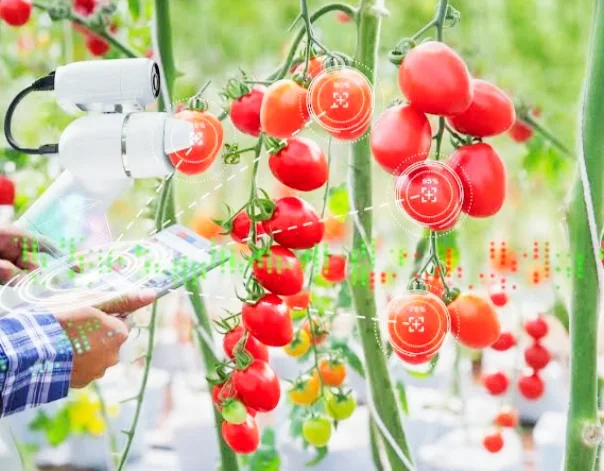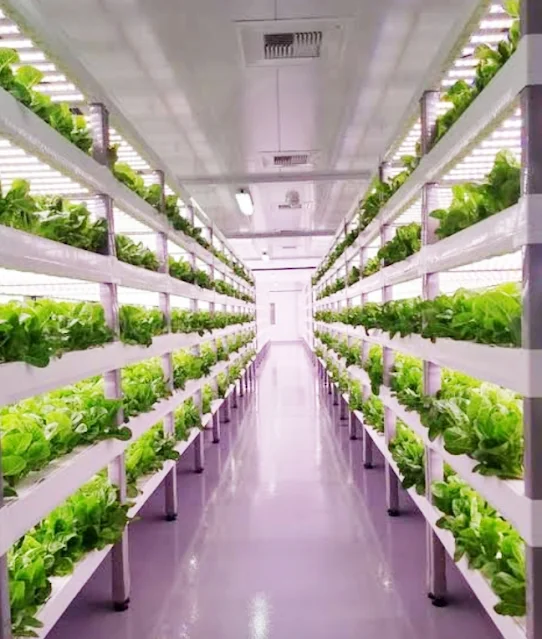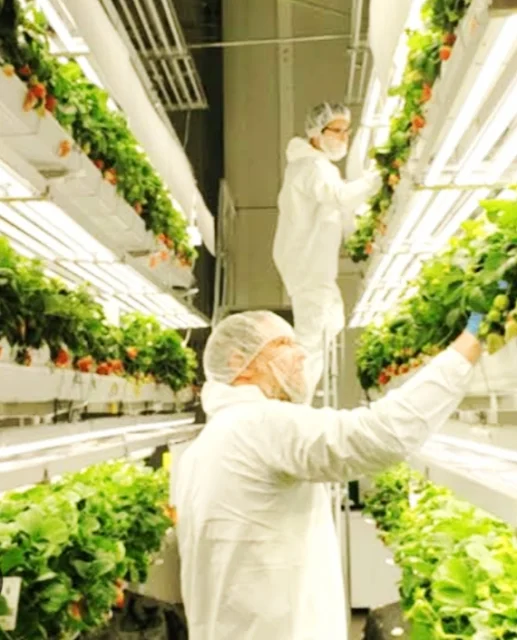Company Key Players in Modern Agriculture
Cultivating Innovation: Key Players in Modern Agriculture
Key Features of Modern Agriculture
Modern agriculture, characterized by its reliance on technology and innovation, incorporates several key features that have significantly transformed agricultural practices. Here's a table summarizing some of the most prominent features:
Feature Description Precision Agriculture Utilizing advanced technologies like GPS, GIS, and sensors to gather and analyze data about soil, crops, and weather conditions, enabling farmers to make precise decisions about inputs and management practices. Biotechnology Employing genetic engineering techniques to develop crops with improved traits such as higher yields, resistance to pests and diseases, and enhanced nutritional value. Automation Implementing automated systems for tasks like planting, harvesting, and sorting, reducing labor costs and increasing efficiency. Vertical Farming Growing crops in controlled environments, often stacked vertically, to maximize yield in limited spaces and reduce reliance on traditional agricultural land. Hydroponics and Aquaponics Cultivating plants without soil, using nutrient-rich water solutions (hydroponics) or combining plant cultivation with aquaculture (aquaponics) to create sustainable food production systems. Internet of Things (IoT) Connecting agricultural equipment and sensors to the internet to collect and analyze data, enabling real-time monitoring and control of agricultural operations. Big Data Analytics Using large datasets to identify patterns and trends in agricultural production, helping farmers make informed decisions and optimize their practices. Renewable Energy Incorporating renewable energy sources like solar and wind power to reduce the environmental impact of agricultural operations. Sustainable Agriculture Adopting practices that minimize environmental harm, conserve natural resources, and promote biodiversity.
These features collectively contribute to a more efficient, productive, and sustainable agricultural sector, addressing challenges such as food security, resource scarcity, and climate change.
Modern agriculture, characterized by its reliance on technology and innovation, incorporates several key features that have significantly transformed agricultural practices. Here's a table summarizing some of the most prominent features:
| Feature | Description |
|---|---|
| Precision Agriculture | Utilizing advanced technologies like GPS, GIS, and sensors to gather and analyze data about soil, crops, and weather conditions, enabling farmers to make precise decisions about inputs and management practices. |
| Biotechnology | Employing genetic engineering techniques to develop crops with improved traits such as higher yields, resistance to pests and diseases, and enhanced nutritional value. |
| Automation | Implementing automated systems for tasks like planting, harvesting, and sorting, reducing labor costs and increasing efficiency. |
| Vertical Farming | Growing crops in controlled environments, often stacked vertically, to maximize yield in limited spaces and reduce reliance on traditional agricultural land. |
| Hydroponics and Aquaponics | Cultivating plants without soil, using nutrient-rich water solutions (hydroponics) or combining plant cultivation with aquaculture (aquaponics) to create sustainable food production systems. |
| Internet of Things (IoT) | Connecting agricultural equipment and sensors to the internet to collect and analyze data, enabling real-time monitoring and control of agricultural operations. |
| Big Data Analytics | Using large datasets to identify patterns and trends in agricultural production, helping farmers make informed decisions and optimize their practices. |
| Renewable Energy | Incorporating renewable energy sources like solar and wind power to reduce the environmental impact of agricultural operations. |
| Sustainable Agriculture | Adopting practices that minimize environmental harm, conserve natural resources, and promote biodiversity. |
These features collectively contribute to a more efficient, productive, and sustainable agricultural sector, addressing challenges such as food security, resource scarcity, and climate change.
Modern Farming Landscape
Here's a table outlining some key aspects of the modern farming landscape:
| Aspect | Description | Example |
|---|---|---|
| Farming Practices | * Precision Agriculture: Utilizing technology like GPS, sensors, and data analysis for targeted resource use (water, fertilizer) and improved yields. * Vertical Farming: Growing crops in vertically stacked layers indoors, often in urban areas. * Hydroponics: Growing plants without soil, using mineral nutrient solutions in water. | * Farmers using drone imagery to identify areas needing more water. * A skyscraper farm growing lettuce in a major city. * A greenhouse operation growing tomatoes hydroponically. |
| Technology | * Automation: Employing robots, drones, and other machines to automate tasks like planting, harvesting, and milking. * Agricultural Sensors: Sensors that monitor soil moisture, nutrient levels, and crop health. * Data Analytics: Using data to optimize farm operations, predict yields, and identify potential problems. | * A robotic milking parlor * Sensors embedded in fields to track soil moisture. * Software analyzing farm data to predict crop disease outbreaks. |
| Sustainability | * Cover Cropping: Planting cover crops to protect soil health, suppress weeds, and improve fertility. * Integrated Pest Management (IPM): Using a variety of methods to control pests, minimizing reliance on chemical pesticides. * Water Conservation Techniques: Practices like drip irrigation to reduce water usage. | * Planting clover as a cover crop between corn plantings. * Using natural predators like ladybugs to control aphids. * Employing drip irrigation systems in orchards. |
| Market Trends | * Direct-to-Consumer (D2C) Marketing: Selling produce directly to consumers, often through online platforms or farmers' markets. * Organic Farming: Growing crops without synthetic pesticides or fertilizers. * Locally Grown Food: Consumers seeking food grown close to where they live. | * A farm offering a subscription service for weekly vegetable deliveries. * A farm certified organic by the USDA. * A community-supported agriculture (CSA) program connecting consumers with local farms. |
This table provides a brief overview. Each aspect has many sub-categories and ongoing advancements.
Modern agriculture is a complex ecosystem that relies on a diverse range of companies to ensure efficient, sustainable, and productive food production. From the seeds we sow to the technologies that optimize our fields, numerous players contribute to putting food on our tables. This introduction dives into some of the key company stakeholders driving innovation and progress in this vital sector.
The Players on the Field:
The landscape of modern agriculture is populated by companies across various sectors, each playing a crucial role:
- Seed Companies: Develop genetically modified seeds with improved yields, pest resistance, and environmental resilience. (e.g., Bayer Crop Science, Corteva Agriscience)
- Agricultural Chemical Companies: Produce fertilizers, pesticides, and herbicides that enhance crop growth and protect against pests and diseases. (e.g., BASF, DowDuPont)
- Precision Agriculture Technology: Develop data-driven technologies like GPS guidance systems, soil sensors, and automated machinery to optimize resource use and farm management. (e.g., Deere & Company, Trimble Inc.)
- Vertical Farming Companies: Pioneering indoor farming techniques that utilize controlled environments for higher yields and reduced reliance on land and water resources. (e.g., Plenty, AeroFarms)
- Alternative Protein Companies: Develop plant-based and lab-grown meat alternatives to address sustainability concerns and meet the growing demand for protein. (e.g., Beyond Meat, Impossible Foods)
Beyond the List:
This is just a glimpse into the vast array of companies that contribute to modern agriculture. Other important players include:
- Agricultural Equipment Manufacturers: Providing tractors, harvesters, and other essential machinery for efficient farming operations.
- Logistics Providers: Ensuring the smooth transportation and distribution of agricultural products from farm to consumer.
- Financial Institutions: Offering financial services and risk management solutions to farmers.
Looking Ahead:
The future of agriculture promises continued innovation and technological advancements. By understanding the diverse roles of these key companies, we gain a deeper appreciation for the complex system that brings food to our plates.
Modern agriculture is a complex system that relies on a variety of players to ensure efficient and sustainable food production.
Here's a look at some of the key company stakeholders driving innovation and progress in the industry:
| Company Type | Key Players | Role in Modern Agriculture |
|---|---|---|
| Seed Companies | Bayer Crop Science, Corteva Agriscience, Syngenta | Develop genetically modified seeds with improved yields, pest resistance, and environmental resilience. |
| Agricultural Chemical Companies | BASF, DowDuPont, FMC Corporation | Produce fertilizers, pesticides, and herbicides that enhance crop growth and protect against pests and diseases. |
| Precision Agriculture Technology | Deere & Company, Trimble Inc., Tetra Laval | Develop data-driven technologies like GPS guidance systems, soil sensors, and automated machinery to optimize resource use and farm management. |
| Vertical Farming Companies | Plenty, AeroFarms, Gotham Greens | Pioneering indoor farming techniques that utilize controlled environments for higher yields and reduced reliance on land and water resources. |
| Alternative Protein Companies | Beyond Meat, Impossible Foods, Memphis Meats | Develop plant-based and lab-grown meat alternatives to address sustainability concerns and meet the growing demand for protein. |
Note: This table provides a limited selection of key players. Many other companies across various sectors contribute to modern agriculture, including agricultural equipment manufacturers, logistics providers, and financial institutions.
Additional Considerations:
- The role of some companies can be multifaceted. For example, Bayer Crop Science not only develops seeds but also produces crop protection chemicals.
- The landscape of modern agriculture is constantly evolving with new technologies and innovations emerging.
Seed Companies: Power Players in Modern Agriculture
Seed companies sit at the foundation of modern agriculture, playing a critical role in ensuring global food security. These companies develop, produce, and distribute seeds for a vast array of crops, from grains that feed millions to the vegetables gracing our dinner tables.
Here's a deeper dive into the world of seed companies and their significance in today's agricultural landscape:
The Role of Seed Companies:
- Innovation: Seed companies invest heavily in research and development to create improved seed varieties with desirable traits. This can include increased yields, enhanced disease and pest resistance, improved drought tolerance, and better nutritional value.
- Genetic Diversity: Some companies specialize in preserving heirloom or open-pollinated seeds, promoting biodiversity and ensuring the long-term viability of our food system.
- Distribution: Seed companies establish complex supply chains to deliver seeds to farmers around the world. This ensures accessibility to high-quality seeds for various growing conditions.
Types of Seed Companies:
- Major Seed Companies: These are multinational corporations that dominate the global seed market. They focus on developing genetically modified organisms (GMOs) and hybrid seeds, aiming to maximize yields and uniformity. (Examples: Bayer Crop Science, Corteva Agriscience, Syngenta)
- Small and Regional Seed Companies: These companies cater to specific regions or cater to niche markets. They often specialize in organic, heirloom, or open-pollinated seeds, promoting biodiversity and catering to specific consumer preferences.
The Future of Seed Companies:
The seed industry is constantly evolving. Here are some key trends to watch:
- Gene Editing: New gene editing technologies like CRISPR are revolutionizing seed development, allowing for more precise and targeted improvements.
- Climate-Smart Seeds: Seed companies are developing varieties that are more resilient to climate change, such as those with improved drought tolerance or heat resistance.
- Sustainability: There is a growing focus on sustainable seed production practices that minimize environmental impact.
Table: Major Seed Companies and their Focus
| Company | Focus Area |
|---|---|
| Bayer Crop Science | GMOs, Herbicide-tolerant crops |
| Corteva Agriscience | Corn and Sunflower seeds, Trait technology |
| Syngenta | Herbicides, Insecticides, Fungicides |
| Limagrain | Cereals (wheat, corn, barley), Field crops (soybean, sunflower) |
| KWS SAAT SE & Co. KGaA | Corn, Sugarbeet, Cereals |
Important Note: This table presents a selection of major seed companies. There are many other seed companies worldwide, each with its unique approach and seed offerings.
The Chemical Arsenal: Agricultural Chemical Companies in Modern Farming
Agricultural chemical companies are vital players in the modern agricultural landscape. These companies develop, manufacture, and distribute a wide range of products designed to protect crops and enhance yields. From battling pests and diseases to promoting growth, agricultural chemicals play a crucial role in ensuring food security for a growing global population.
The Role of Agricultural Chemical Companies:
- Pest and Disease Control: Agricultural chemicals, including herbicides, insecticides, and fungicides, help farmers combat a vast array of threats to their crops. These products can significantly reduce crop losses and ensure a more stable and predictable harvest.
- Nutrient Management: Fertilizers are a key product line for many agricultural chemical companies. These fertilizers provide essential nutrients to crops, promoting healthy growth and maximizing yields.
- Innovation: The industry is constantly developing new and more targeted chemical solutions. This includes research on biopesticides, which are derived from natural sources and often pose less risk to the environment.
Challenges and Considerations:
- Environmental Impact: The use of agricultural chemicals can have unintended consequences on the environment. Companies are increasingly focusing on developing sustainable practices and creating products with lower environmental footprints.
- Resistance: Overreliance on certain chemicals can lead to pests and diseases developing resistance. Companies are working on integrated pest management (IPM) strategies that combine various methods for long-term control.
Table: Major Agricultural Chemical Companies and their Products:
| Company | Key Products |
|---|---|
| BASF | Herbicides, Fungicides, Insecticides, Crop protection solutions |
| DowDuPont | Herbicides, Insecticides, Fungicides, Seed treatments |
| FMC Corporation | Insecticides, Fungicides, Herbicides, Specialty chemicals |
| Bayer CropScience | Herbicides, Insecticides, Fungicides, Seeds |
| Syngenta | Herbicides, Insecticides, Fungicides, Seeds |
Additional Notes:
- This table presents a selection of major agricultural chemical companies. There are many other companies of various sizes operating in this sector.
- Some companies, like Bayer CropScience and Syngenta, also have seed development divisions.
Cultivating with Precision: How Technology is Transforming Agriculture
Precision agriculture, a data-driven approach to farming, is revolutionizing the way we grow food. By utilizing cutting-edge technology, farmers can gain deeper insights into their land and crops, leading to increased efficiency, sustainability, and profitability.
The Power of Precision:
Precision agriculture leverages a range of technologies to create a more informed and targeted management strategy. Here's a glimpse into some key tools:
- Global Navigation Satellite Systems (GNSS): GNSS like GPS allows for precise positioning within fields, facilitating automated machinery and data collection.
- Remote Sensing: Data from satellites, drones, and sensors capture valuable information about soil health, crop growth, and potential issues.
- Variable Rate Technology (VRT): This technology enables the application of fertilizers, pesticides, and water at precise rates based on specific needs of different areas within a field.
- Yield Monitors: These tools track crop yield data in real-time, allowing farmers to identify areas requiring adjustments for optimal results.
- Advanced Farm Management Software: Software platforms integrate data from various sources, providing insightful analytics and recommendations for optimizing farm operations.
Benefits of Precision Agriculture:
- Increased Yields: By pinpointing areas requiring more or less resources, precision agriculture helps maximize yields and optimize resource use.
- Reduced Environmental Impact: Targeted application of inputs minimizes waste and potential environmental pollution.
- Improved Sustainability: Precision practices like soil testing and optimized irrigation promote long-term land health and resource conservation.
- Enhanced Decision-Making: Data-driven insights allow farmers to make informed decisions about crop management practices, leading to greater efficiency and profitability.
Table: Key Players in Precision Agriculture Technology
| Company | Area of Expertise |
|---|---|
| Deere & Company | Agricultural machinery, Automation & guidance systems |
| Trimble Inc. | GNSS technology, Farm management software |
| Tetra Laval | Precision dairy farming technology, Robotics |
| The Climate Corporation (owned by Bayer) | Data analytics, Crop modeling software |
| Senseonics (acquired by Bayer) | Plant stress monitoring sensors |
The Future of Precision Agriculture:
The future of precision agriculture is brimming with potential. Here are some exciting trends to watch:
- Artificial Intelligence (AI): AI can analyze vast datasets to identify patterns and predict crop performance, leading to even more intelligent decision-making.
- Internet of Things (IoT): Sensor networks and connected devices will collect real-time data on a wider range of farm parameters, offering unparalleled insights.
- Robotics and Automation: Autonomous equipment and robots will perform tasks like planting, harvesting, and weed control with greater precision and efficiency.
Precision agriculture holds immense promise for creating a more sustainable, productive, and profitable future for farming. As technology continues to evolve, we can expect even more innovative solutions to emerge, ensuring a brighter future for our food system.
Stacking Success: Vertical Farming Companies Take Root in Modern Agriculture
Vertical farming, a revolutionary approach to agriculture, is reshaping how we grow food. By cultivating crops in vertically stacked layers indoors, these farms offer numerous advantages, including increased yields, minimized land use, and reduced reliance on traditional resources. Here, we explore the world of vertical farming companies and their role in the future of food production.
The Rise of Vertical Farms:
Vertical farming companies are pioneers in this innovative space. They design, develop, and operate controlled-environment facilities where crops are grown under optimized conditions. Here are some key benefits of vertical farming:
- Year-Round Production: Vertical farms are not subject to seasonal limitations, allowing for consistent production regardless of weather conditions.
- Reduced Land Use: Vertical farming utilizes minimal land compared to traditional agriculture, making it ideal for urban areas and regions with limited arable land.
- Efficient Resource Use: Vertical farms often employ hydroponic or aeroponic systems, which minimize water usage and eliminate the need for soil.
- Improved Sustainability: Reduced reliance on pesticides and fertilizers alongside efficient water use contributes to a more sustainable agricultural approach.
Key Players in Vertical Farming:
Several companies are at the forefront of vertical farming technology, each with its own unique approach:
- Plenty: This company utilizes artificial intelligence and automation to cultivate leafy greens in their vertical farms.
- AeroFarms: AeroFarms leverages aeroponic systems and LED lighting to grow a variety of flavorful and pesticide-free produce.
- Gotham Greens: Gotham Greens focuses on building and operating large-scale vertical farms in urban areas, providing fresh, local produce to consumers.
- Infinite Harvest: Specializing in microgreens, Infinite Harvest utilizes vertical farming and hydroponic technology for year-round production.
- Bowery Farming: Bowery Farming operates large indoor vertical farms that grow a variety of lettuces, herbs, and other greens using sustainable practices.
Table: Vertical Farming Companies and their Specialties
| Company | Specialty |
|---|---|
| Plenty | Leafy greens |
| AeroFarms | Leafy greens, Herbs |
| Gotham Greens | Leafy greens, Herbs |
| Infinite Harvest | Microgreens |
| Bowery Farming | Leafy greens, Herbs |
The Future of Vertical Farming:
Vertical farming offers a glimpse into a future where food production is more sustainable, efficient, and resilient. As the industry matures, we can expect advancements in areas like:
- Cost Reduction: Making vertical farming more cost-competitive will be crucial for wider adoption.
- Crop Diversity: The ability to grow a wider variety of crops, including fruits and vegetables, will broaden the appeal of vertical farming.
- Integration with Technology: Continued advancements in AI, automation, and data analysis will further optimize vertical farming operations.
Vertical farming companies are paving the way for a more sustainable and productive food system. By harnessing innovation and technology, they are helping to cultivate a brighter future for agriculture.
Redefining Meat: Alternative Protein Companies Disrupting the Food Chain
The landscape of protein consumption is undergoing a significant shift. Alternative protein companies are at the forefront of this change, developing innovative plant-based, fermentation-derived, and lab-grown meat alternatives. These companies aim to address several key concerns associated with traditional meat production, including environmental impact, animal welfare, and resource sustainability.
The Rise of Alternative Proteins:
Alternative protein companies are driven by a vision of a more sustainable and ethical food system. Here's a breakdown of the main approaches:
- Plant-Based Proteins: These products replicate the taste and texture of meat using plant-based ingredients like soy, pea protein, and mycoprotein. They are often lower in saturated fat and cholesterol compared to conventional meat.
- Fermentation-Derived Proteins: This approach utilizes microorganisms like fungi or yeast to create protein-rich ingredients. Fermentation allows for the production of novel protein sources with desirable textural properties.
- Lab-Grown Meat (Cultured Meat): This involves growing meat from animal cells in a controlled environment. Lab-grown meat offers the closest experience to conventional meat in terms of taste and texture.
Benefits of Alternative Proteins:
- Reduced Environmental Impact: Alternative protein production generally requires less land, water, and energy compared to traditional meat production.
- Improved Animal Welfare: These products eliminate the need for factory farming practices associated with conventional meat production.
- Enhanced Public Health: Plant-based proteins are often lower in saturated fat and cholesterol, potentially contributing to a healthier diet.
Table: Pioneering Alternative Protein Companies
| Company | Approach | Key Products |
|---|---|---|
| Beyond Meat | Plant-Based | Burgers, sausages, plant-based minced meat |
| Impossible Foods | Plant-Based | Burgers, sausages, ground "meat" |
| Memphis Meats | Lab-Grown Meat | Meatballs, steaks, ground meat |
| Quorn | Mycoprotein | Meat substitutes, vegetarian mince |
| Perfect Day | Fermentation | Dairy alternatives (milk, cheese) |
The Future of Alternative Proteins:
The future of alternative proteins is brimming with innovation. Here are some exciting trends to watch:
- Improved Taste and Texture: Companies are continuously refining their products to create even more realistic and delicious alternatives.
- Cost Reduction: Making alternative proteins more affordable will be crucial for wider consumer adoption.
- Increased Variety: Expect to see a wider range of alternative protein products cater to different tastes and dietary needs.
Alternative protein companies are leading the charge towards a more sustainable and ethical food system. By harnessing innovation and science, these companies are redefining protein consumption for the future.
Conclusion: Cultivating a Sustainable Future Together
The companies shaping modern agriculture are not simply cogs in a machine; they are the architects of a complex system that nourishes billions. From the meticulous science of seed development to the high-tech wizardry of precision agriculture, each player contributes an essential piece to the puzzle.
As we look towards the future, collaboration will be key. Seed companies, agricultural chemical companies, and technology providers must work together to ensure sustainable practices and responsible innovation. Vertical farming companies and alternative protein companies offer exciting possibilities for minimizing environmental impact and meeting the demands of a growing population.
The future of food security rests on the shoulders of these key players. By fostering innovation, embracing sustainable practices, and working collaboratively, they have the potential to cultivate a brighter future for agriculture – a future that ensures food security for all.

.jpg)
